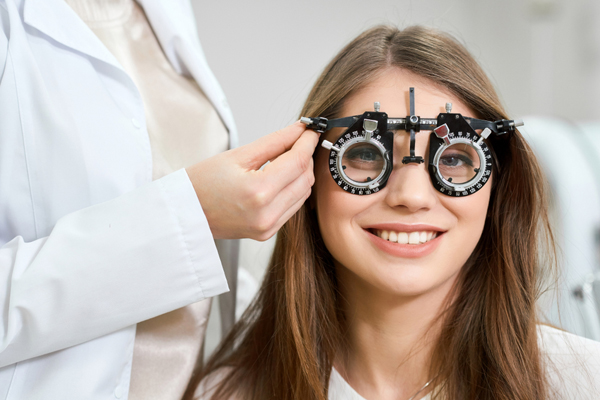When Ortho-k Might Be Recommended by Your Optometrist

Ortho-k utilizes gas-permeable contact lenses (ortho-k lenses) to treat conditions such as myopia, presbyopia, and astigmatism. However, ortho-k may not be right for every individual with one of these three conditions. Understanding what ortho-k treatment is and who is an ideal candidate can be helpful to determine if you should pursue treatment.
Reviewing the purpose of ortho-k
Ortho-k helps many patients who are not seeing the results they desire from soft contact lenses or alternative solutions. The following review discusses what ortho-k treatment is, when it is recommended, and who makes an ideal candidate for treatment.
What is ortho-k?
Orthokeratology (ortho-k) involves the design and fitting of gas-permeable contact lenses. Gas-permeable contact lenses, also called GP lenses or ortho-k lenses, reshape the cornea to allow for clearer vision throughout each day. They provide better oxygen supply compared to soft contact lenses and may also provide improved comfort and durability.
When is ortho-k recommended?
Ortho-k is most commonly recommended for patients with myopia (nearsightedness). Myopia affects the individual’s ability to see far away, although they can typically see fairly well close up. Specifically, ortho-k lenses can correct refractive eros, and they may also help slow the rate of progression of childhood myopia. Ortho-k lenses are used less often by optometrists to treat presbyopia (farsightedness). Some optometrists may also recommend ortho-k lenses to treat astigmatism as well.
What vision concerns can ortho-k correct?
Individuals who are diagnosed with myopia and have -6.00 diopters of nearsightedness typically make for the ideal candidate for ortho-k lenses. However, this is not a hard and fast rule, and optometrists examine whether or not a patient is an ideal candidate for ortho-k lenses on a case-by-case basis. In general, individuals with myopia, or to a lesser degree presbyopia or astigmatism, who are not seeing the results they desire from soft contact lenses should visit the optometrist to find out how ortho-k might benefit them.
Who is an ideal candidate for ortho-k treatment?
Most patients with non-severe cases of myopia make for good ortho-k treatment candidates. While some may benefit more than others, there are few to no risks involved with treatment. Keep in mind that corneal reshaping is temporary, and symptoms of myopia may return if the patient stops wearing ortho-k lenses.
What results can I expect with ortho-k?
Most patients see their vision improve after ortho-k treatment. Of course, 20/20 vision is a desirable outcome. Many patients reach this level, at least temporarily. Specifically, 67 percent of ortho-k patients reach 20/20 vision, and more than 90 percent reach 20/32 vision according to an FDA study.
Schedule an ortho-k consultation with our optometrist
If you are having issues with your vision, then contact our optometrist today by phone or message. We can examine why you are having trouble with your vision and help you find the right solution to improve the way you see each day. So why wait? Contact our team today to schedule a convenient visit.
Get more information here: https://brighteyesmv.com or call Bright Eyes Optometry at (914) 668-1429
Check out what others are saying about our services on Yelp: Ortho-k in Mt Vernon, NY.
Recent Posts
Emergency eye care is needed if you find yourself dealing with a problem with your eye that causes pain or affects your vision. Failing to treat eye injuries as soon as they are detected can lead to permanent consequences, like reduced vision or blindness. Common eye injuries that require emergency eye care include: Exposure to…
Looking for more information on eye protection? An ophthalmologist knows everything there is to know about protecting the eyes. While there are a few different types of eye care professionals, ophthalmologists are eye care professionals who have undergone additional years of education and training so they can offer their patients both medical and surgical eye…
Controlling myopia at an early age can slow down its progression. This can help prevent yearly upgrades for stronger glasses. Your optometrist can help by offering various treatments. If you want to find out how your optometrist can help control myopia, here are the details.Optometrists use atropine eye drops to achieve short-term myopia control results.…
Another word for an itchy eye is ocular pruritis. It is a common health situation in many people. Itchiness in your eyes is more than enough reason to see an optometrist. Receiving prompt treatment is important in receiving prompt relief. If you want to know what causes an itchy eye and the treatments for it,…



